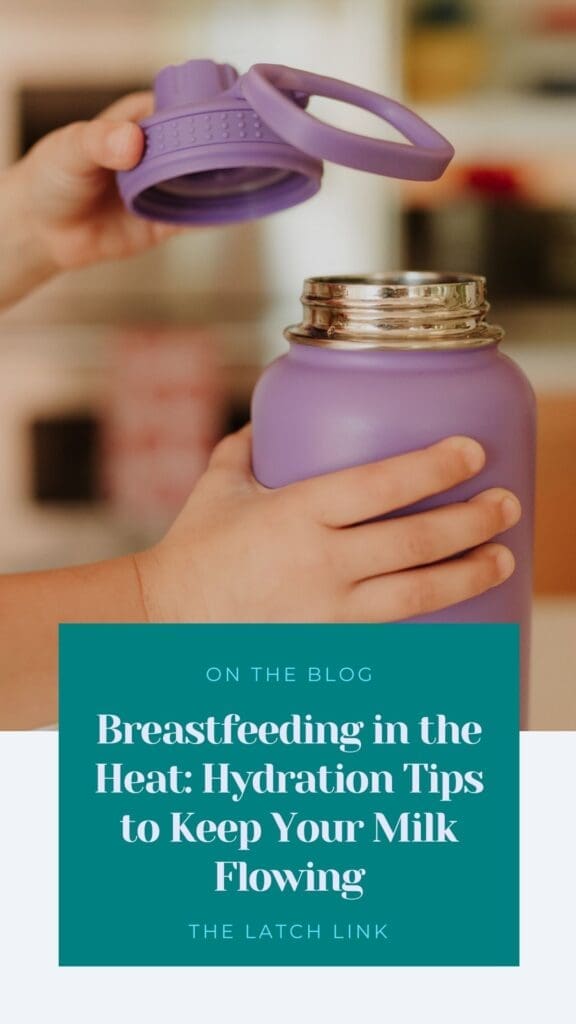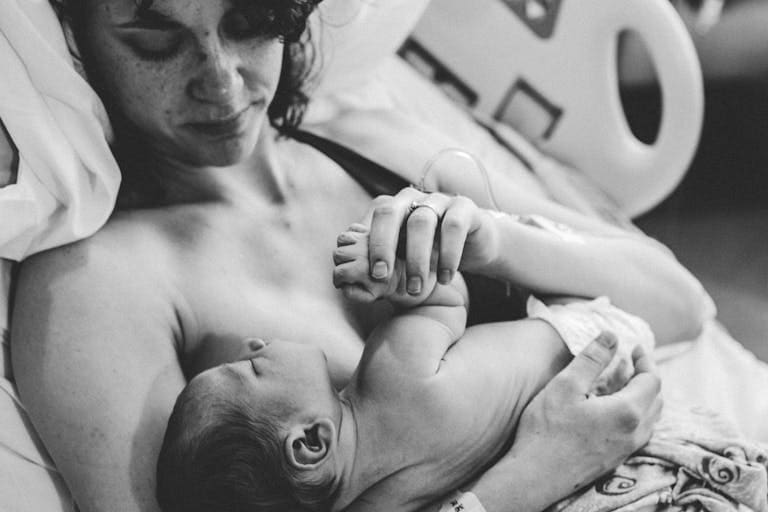Hydration While Breastfeeding: How to Stay Cool and Keep Your Milk Supply Up This Summer
Summer breastfeeding: it’s sweaty, sticky, and surprisingly draining. Whether you’re cluster feeding a newborn or juggling an on-the-go toddler who still nurses, you’ve probably felt the heat—literally and figuratively. Nursing in the summer months can feel like a full-body workout, especially when you’re stuck under a sleepy, sweaty baby.
If you’re feeling more wiped out than usual, you’re not imagining it. And while the internet will tell you to “just drink more water,” staying hydrated while nursing in summer is about more than just chugging gallons. It’s about smart hydration—the kind that actually supports your milk supply, energy levels, and overall well-being.
Let’s break down what that looks like.
Disclosure: This post contains affiliate links. If you click on a link and make a purchase, I may earn a small commission at no extra cost to you. I only recommend products I genuinely trust and believe will be helpful to my readers.You can read more about the affiliate disclosure here.
Why Proper Hydration While Breastfeeding Matters
Hydration isn’t just about quenching thirst—it plays a direct role in hormone regulation, milk production, and your energy levels as a whole.
Your body uses a ton of water to produce breast milk. In fact, breastfeeding increases your fluid needs more than pregnancy does. When you’re dehydrated, your body has to work harder to prioritize basic functions, which can cause milk production to dip. It can also leave you feeling sluggish, moody, or even a little foggy.
Plus, fluid balance affects the hormones responsible for lactation. Oxytocin (which helps your letdown reflex) and prolactin (which helps make milk) both depend on a well-hydrated system. When your body is short on fluids or essential minerals, these hormones can get thrown off, making feeding feel more difficult than it needs to be.
So staying hydrated while nursing—especially in summer—doesn’t just make you feel better. It literally helps your body do what it’s trying to do.
Signs You’re Dehydrated
So how do you know if you’re truly dehydrated—or just tired from, well, being a parent?
Here are a few red flags that your hydration game might need some help:
- Fatigue or foggy thinking (that’s not just newborn life)
- Headaches that creep in mid-morning or afternoon
- Dark or infrequent urine
- Sudden cravings—especially salty or sugary ones
- Lower milk output—or a slower letdown than usual
- Fussy nursing sessions—baby seems unsatisfied or extra irritable at the breast
If several of these sound familiar, it’s worth tuning into your hydration habits. The good news? You don’t need to overhaul your routine—you just need to make a few strategic swaps.
What to Drink (and What Not To) For Hydration While Breastfeeding
When it comes to breastfeeding in summer, plain water isn’t always your best friend. In fact, drinking only water—especially in large amounts—can actually flush out essential minerals your body needs to function. That’s where electrolytes come in.
What To Drink:
- Electrolyte-rich drinks like mineral broths, coconut water, and clean hydration mixes
- Adrenal cocktails (a mix of sodium, potassium, and whole food vitamin C)
- Fruit-infused water—add citrus, berries, cucumber, or mint for a flavor and nutrient boost
- Homemade popsicles with coconut water or bone broth bases for hot afternoons
These help your body absorb and retain fluids for hydration while breastfeeding, rather than just peeing them right out.
What Not To Rely On:
- Sugary sports drinks — They might seem like a good idea for quick electrolytes, but most are packed with artificial dyes, added sugars, and unnecessary fillers.
- Broths — While the protein, sodium, and minerals in broths can be helpful, they shouldn’t be your only source of fluids. Relying solely on broths can mean you’re missing out on other key electrolytes and hydration sources your body needs—especially during high-demand seasons. And many store-bought versions are heavy on sodium, which may leave you feeling thirstier than before.
- Too much caffeine — Your iced coffee fix is totally okay in moderation (praise hands!), but going overboard can be dehydrating. Caffeine is a diuretic, which means it can cause your body to lose more fluids. Try to balance your intake and pair every caffeinated drink with a full glass of water.
- Plain water only — Water is great and absolutely necessary, but it might not be enough on its own—especially in extreme heat or if you’re nursing around the clock.
It’s all about balance. You need fluids and minerals to stay energized and keep your supply humming.
Want more like this? Join The Latch Link Newsletter!
What I Personally Use For Hydration While Breastfeeding
I’ve tried a lot of hydration boosters over the years—some great, some gimmicky. But these are the ones I keep coming back to, especially in the summer months when nursing feels like a marathon:
- Adrenal Cocktail – My daily go-to. It combines sodium, potassium, and whole-food vitamin C in a super bioavailable form. I notice a real difference in my energy and mental clarity when I take this consistently, especially on high-nursing days or when I’m sweating more than usual.
- Pickleball Cocktail – This is like a deeper dive into potassium support. I reach for it when I’ve had a long walk, a hot afternoon, or just feel depleted. It helps ward off that late-day crash that used to hit me around 3 p.m.
- Paleovalley Essential Electrolytes – These are great for clean ingredient lists—no junk, no fillers, and all food-based minerals. If you’re looking for something super pure and mama-safe, this one’s a solid option.
These aren’t magic—but they do make a noticeable difference when I’m consistent. I feel clearer, more stable, and way less wiped out after long nursing days.
Summer Feeding Tips
Once your hydration is on point, it’s time to think about how you can make nursing more bearable in the heat:
- Cool down your baby before feeding—a damp cloth or a quick rinse in the sink can help bring their body temp down before a feed.
- Nurse in the shade if you’re outside, or near a fan indoors.
- Use breathable wraps and slings—opt for linen or muslin over thick knits to help both of you stay cooler.
- Try laid-back positions—cradle hold can feel extra sticky in summer; leaning back lets air circulate better.
- Keep a small towel nearby—to blot both you and baby during or after feeds and reduce friction or trapped heat.
Even little shifts like these can reduce frustration and help you both stay more comfortable.
Still Struggling with Hydration While Breastfeeding or Milk Supply?
If you’ve tried all the above—hydration hacks, nursing tweaks, cooling tips—but your baby’s still fussy at the breast or your supply feels off, hydration might not be the full story.
Book a virtual lactation consult. Sometimes latch issues, tongue ties, or feeding mechanics are the real root. Many consults are now covered by insurance, and a quick call can make all the difference.
You don’t have to white-knuckle your way through the summer. With a few smart changes, you can support your body, protect your milk supply, and feel way more human while doing it.
Liked this post? Don’t forget to save it for later!











